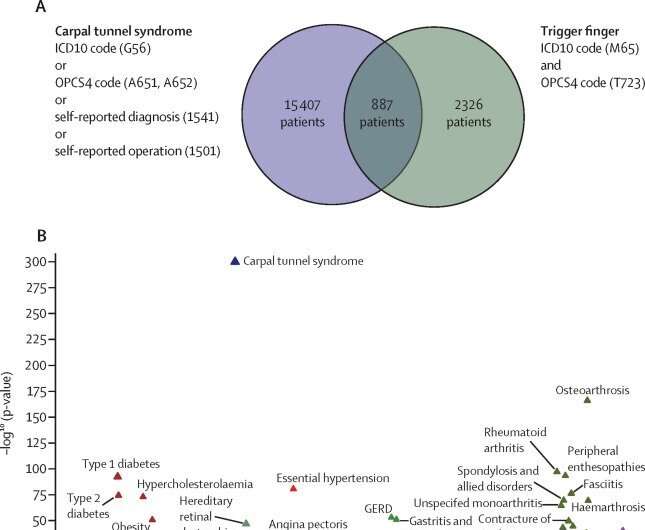
A new NDORMS study, published in The Lancet Rheumatology, has found a genetic variant that increases the risk of both carpal tunnel syndrome and trigger finger, and opens the door for new therapies that involve blocking the IGF-1 pathway.
Carpal tunnel syndrome (CTS) and trigger finger (TF) are the two most common diseases of the hand, accounting for over 60,000 operations per year in the U.K. alone, and large economic cost worldwide.
It is well known among hand surgeons that these two conditions often occur together, but the reason for this is unknown.
Dr. Akira Wiberg, NIHR clinical lecturer in plastic surgery and co-senior author of the study said, “We’ve known for a long time that trigger finger and carpal tunnel syndrome—two of the commonest hand diseases worldwide—frequently co-exist in patients, but the reason for this has remained unclear. We’ve shown for the first time that this co-occurrence can partly be explained by genetics.”
The NDORMS researchers hypothesized that the co-occurrence of carpal tunnel syndrome and trigger finger may in part be explained by a shared genetic predisposition. To test the theory, they performed a genome-wide association study (GWAS) of trigger finger in the U.K. Biobank, a population-based cohort of approx. half a million participants from the U.K., and discovered five regions in the genome where sufferers of trigger finger carry, on average, different genetic variants from people who don’t have trigger finger.
One of those genetic variants is the same variant that increases the risk of carpal tunnel syndrome, which the team previously discovered in their 2019 GWAS of carpal tunnel syndrome. The genetic variant allows for increased signaling through a growth hormone known as “Insulin-like Growth Factor 1,” or IGF-1 pathway.
A Finnish population-based cohort called FinnGen was used to validate this finding—showing that the genetic variant that increases the risk of both carpal tunnel syndrome and trigger finger in the British cohort has the same effect in the Finnish cohort.
Dr. Wiberg continued, “We found a region in the DNA where sufferers of both diseases are more likely to carry the same genetic variant that ultimately results in increased signaling via the insulin-like growth factor 1 (IGF-1) pathway, providing new evidence that the growth hormone IGF-1 is likely to be a driver of both carpal tunnel syndrome and trigger finger. There are several potential ways of targeting the IGF-1 pathway with drugs or antibodies, which makes our finding particularly exciting.”
Dominic Furniss, Professor of Plastic and Reconstructive Surgery, and, co-senior author said, “This has been a fantastic collaborative effort by our team in Oxford (NDORMS and the Nuffield Department of Clinical Neurosciences (NDCN) and our international colleagues at Cold Spring Harbor Laboratory in New York and The University of New South Wales in Australia.”
Source: Read Full Article
